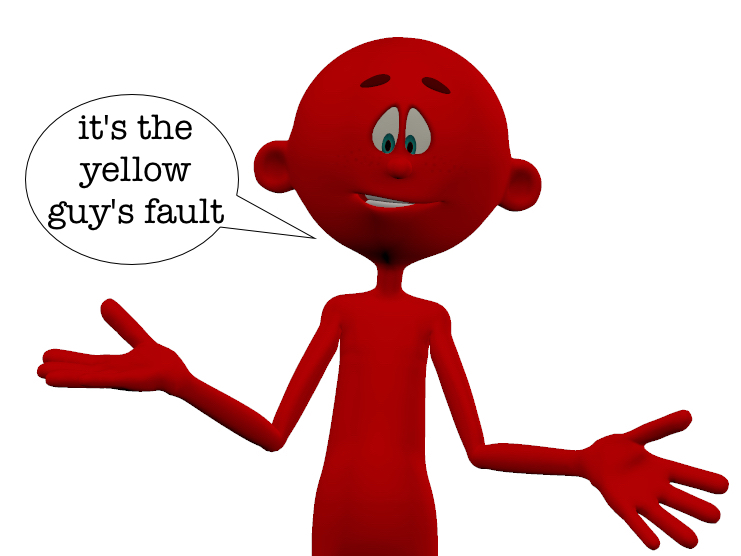Plenty of blame to go around
930 words; reading time around 4 minutes, 30 seconds.
I’m back, albeit sheepishly – heck, my last blog was over 4 months ago! To those who make the effort to visit this site and read my blogs – thank you so much. I apologise for the lull.
I haven’t quit, just distracted and otherwise engaged. I started a new job (great!) and I’ve been working furiously on our textbook in the background. The book was due with the publishers on Nov 31 – the SEND button has just been pushed earlier tonight- only two weeks late sweating out 99,000 words. It will be interesting to see how the strength and conditioning and exercise professional communities respond to it – but it won’t be in print until May/June, so a bit of a wait for that.
Writing the book has taken me places (cognitively) that I’d never been or contemplated before. It’s been a really enjoyable, if not difficult, process. In the book we’re trying to tackle some of the pedagogical and sociocultural influences on strength and conditioning (S&C), so it’s not your usual ‘how to do’ strength and conditioning text!
Things have come up as I researched and wrote various chapters, and I thought I might share a couple of thoughts through this blog. Over the past three weeks I’ve been really struggling with the 15th and final chapter. We’d assigned a working title ‘Looking after yourself as a strength and conditioning coach’ – seemed like a really good idea at the time! Writing that chapter reminded me how work conditions in exercise and sports environment that we all love, can be so precarious and fragile. Each job of course has different issues and threats, but overall the money isn’t huge and jobs don’t offer overly stable career paths!

Strength and conditioning, for example, is incredibly competitive. There are very few organisations out there that can truly afford to employ full-time strength and conditioning coaches (SCC) – so there aren’t many paying gigs. It seems a lot of people aspire to be associated with high level sport – no surprise then that strength and conditioning is an area where many would like to work – often by volunteer or interning for very little – just so they can be involved with high-level sport. But, I’m thinking sport is a highly volatile field for employees. Positions and roles are often tied directly or indirectly to the success of teams or individual athletes, and SCCs can be, and often are, ‘let go’ when success eludes the team or individual.
That should be particularly concerning for a SCC, as I reckon their work is always twice removed from athlete performances. What I mean by that is that unlike the sport coaches – who I think are only once removed from performance – SCCs don’t recruit or select the athletes, don’t design competition strategies, don’t name starters, and don’t have a say on any in-game adjustments – so not a lot of direct influence on competitive outcomes. Acknowledging that – I’m hugely disappointed when a SCC is singled out for blame when athletes fail to perform (win). This tells me that organisations and staff don’t really understand the tenuous relationship between fitness (and changes of fitness) and performance. Sure, poor strength and conditioning practices can chronically exhaust athletes and provoke some injuries, but by and large fitness is just one of many factors that determine success. When SCCs are blamed, what I’m seeing are coaches (and management) who are ducking personal accountability and refusing to take responsibility – just weakly passing on the blame. I’d like to think coaches have more personal integrity and professionalism – unfortunately that often ain’t the case. Sure, coaches are not personally missing penalty kicks or bowling ‘expensive’ overs, but they have to front up for the decisions that they do make; who plays, the tactics adopted, and any in-game tactical repairs.
I’d also be the first to criticise some SCCs who seek to take credit when things are going well. Most SCCs I know are publicly pretty humble about the work that they do, preferring to work anonymously. I’m well aware that SCCs are usually very loud and larger than life, but that’s within their work environments – I’m talking about seeking an external profile through the press and social media. There are a few SSCs out there who are not shy in grabbing a bit of the spotlight, claiming credit for successful performances, and in a way contributing to their own vulnerability. If you are going to accept credit, then you’ve also got to be ready to shoulder the collective blame. Again, sure fitness helps, but keep your role in perspective – it’s just one piece of the performance puzzle.
I don’t have solutions for the way others behave but I think that it falls on S&C professionals to be constantly seizing opportunities to educate others about the work and capabilities of S&C professionals. Don’t leave it up to what others believe, read or learn in the media – every chance should be used to emphasise things like individual variation, and the reality that fitness is just one contributor to performance – a S&C coach can contribute many things over and above getting bigger and stronger in the gym, so lets up-skill coaches and athletes about that balance. The other thing I think SCCs can do is to distance themselves from performance – be clear about strength and conditioning programme objectives, what’s being measured and how you will evaluate your success. Clarity early on may be insurance against that poor performance or season later.
Just some thoughts passing through my head, that may or may not resonate with exercise professionals.
Best, Phil
